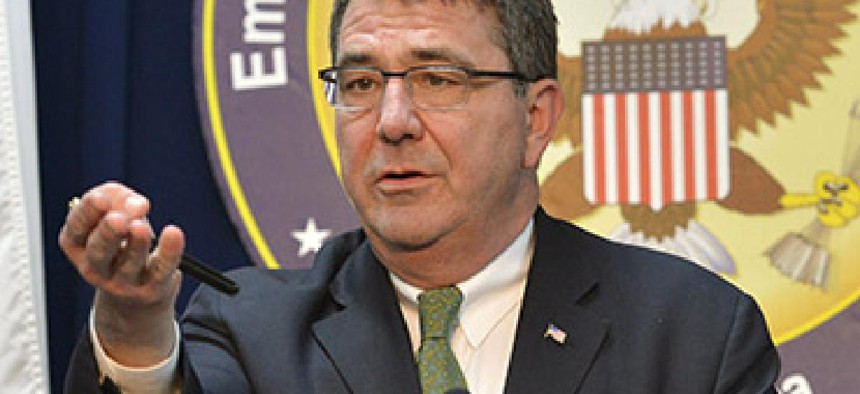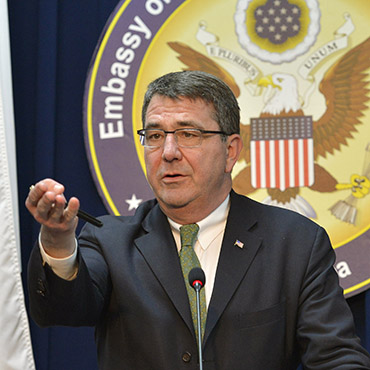Defense chief's email reveals management style, private-sector outreach

The Defense Department has released 1,336 pages of messages and attachments associated with Secretary Ash Carter's personal email account, some of which shed light on his management style and private-sector outreach.

Carter's use of a personal email account for official business continued for months after the public revelation that former Secretary of State Hillary Clinton had used a private server for official business.
The Defense Department released 1,336 pages of messages and attachments involving Secretary Ash Carter's personal email account on March 25 in response to Freedom of Information Act requests from multiple news organizations.
Carter and his advisers hope the release of the email messages, which contain no classified information and often cover routine administrative tasks, will put to rest concerns about the nature of his personal email use. One such critic is Sen. Charles Grassley (R-Iowa), an oversight hawk and chairman of the Senate Judiciary Committee, who wrote Carter in February expressing concern that his private email was vulnerable to hacking by foreign spies.
Carter's use of a personal email account for official business continued for months after the public revelation that Hillary Clinton had exclusively used a private server for official business throughout her tenure as secretary of State.
That Carter continued the practice during the uproar over Clinton's email arrangement baffled many observers, especially given that Carter was no stranger to government email procedures. Before becoming Pentagon chief, he had served as deputy Defense secretary and as undersecretary of Defense for acquisition, technology and logistics.
The New York Times first reported on Carter's use of a personal email account last December, at which time Carter, through a spokesman, said the practice was a mistake and had ceased. The released email messages show that Carter used his personal account with varying frequency for 10 months after being sworn in as Defense secretary in February 2015.
The last message in the batch appears to be an auto-reply Carter set for his personal email on Dec. 18, two days after the Times report.
"I am no longer utilizing personal email for the remainder of my time as secretary of Defense," the message said. "If you need to get in touch with me regarding a personal matter, please contact me on my cell phone. If you are contacting me pertaining to business, please contact my assistant, [redacted]. Please know that anything you send to the .mil address will be a part of official government records."
Carter's messages are often heavily -- and sometimes fully -- redacted; they cover the mundanities of navigating one of the world's largest bureaucracies. There are, however, several buried nuggets that shed light on Carter's management style and the way the private sector is receiving his overtures and angling for his attention. Below are the highlights for FCW readers.
You'll get your time, Franco
Frank Kendall, who has Carter's old job as undersecretary of Defense for acquisition, technology and logistics, has been working with Carter to improve how the Pentagon scouts and adopts emerging technology. But if an email message dated Nov. 25, 2015, is any indication, Kendall would appreciate more of a direct line to Carter.
"Ash, sorry for another back channel, but I thought it was needed," Kendall wrote Carter. "I have very little opportunity to communicate with you directly."
The substantive remainder of the email is redacted, and Carter's reply is also heavily redacted. But Carter assures "Franco," as he calls his chief buyer, that he is in the loop, adding, "Be glad you don't hear from me more often -- others do."
Silicon Valley heavyweights
Carter is the first sitting Defense secretary to set up a Facebook account, and he has apparently struck up a friendship with Facebook Chief Operating Officer Sheryl Sandberg. The two have exchanged warm email messages, with Sandberg offering to help promote DOD's Force of the Future initiative, which addresses the role of women in the military.
After joining Facebook, Carter wrote Sandberg: "I am excited about the ability to connect in a whole new way and can see already the power of the communities and conversations you enable."
Carter has made multiple trips to Silicon Valley in his year or so as DOD chief. After one visit, venture capitalist Marc Andreessen urged Carter to come more often. "The session had a huge impact on everyone who attended and will spread outstanding word of mouth," Andreessen wrote.
Old habits
In a handful of messages, Carter references administrative arrangements he had as deputy Defense secretary, a post he held from 2011 to 2013. In one note to aides, dated May 2, 2015, Carter asked for some guidance on handling his calendar.
"I'm looking at my sched and realize I'm not getting an invite book like I used to in [the deputy secretary of Defense] office," Carter wrote. "So I have no idea what I've been invited to or why I've accepted some. Can u [email address redacted] and [Maj. Gen. Ronald Lewis] confer and give me your advice on how to handle calendar?"
No reply necessary
After Carter's April 2015 speech at Stanford University, Joe Weiss, a systems engineer in attendance, reached out to Carter through an intermediary. "Control system cybersecurity is still not well understood, and there is minimal appropriate technology currently available," Weiss wrote in an email message that a person whose name is redacted forwarded to Carter.
Weiss attached testimony he had given to a Senate committee in 2009 on the subject. Carter in turn forwarded the message to his cybersecurity-minded chief of staff, Eric Rosenbach, with a note: "[For your situational awareness], no specific reply required."
Weiss might have been ahead of the curve. In February, two Navy admirals sent a letter to Carter asking him to pay greater attention to the cybersecurity of industrial control systems.
'Absolutely off the record'
Former CIA Director George Tenet makes a couple appearances in the email messages, once to congratulate Carter on becoming Defense secretary. "Every now and then the good guys win," Tenet wrote, before inviting Carter to an "absolutely off the record" conference with tech executives in Sun Valley, Idaho, hosted by Allen and Co. (Tenet is managing director of the investment firm).
Carter made the trip in July 2015, where he promoted his efforts to link the Pentagon and the technology sector.
NEXT STORY: New technologies for knowledge sharing


